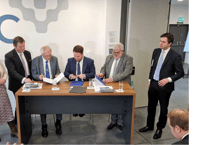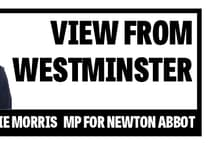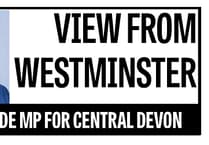UNLIKE some local authorities, Devon County Council has not been left in a position where they could face bankruptcy as a result of the coronavirus crisis.
At least five upper tier authorities – Liverpool, Leeds, Wiltshire, Trafford and Tameside – have warned they would meet the criteria to issue a section 114 notice within 18 months, declaring themselves effectively bankrupt, without more government support.
But Dr Phil Norrey, Devon County Council’s chief executive, said that the current budget gap between money the council has received from the Government and additional costs or lost income as a result of the COVID-19 pandemic was around £2.5 million, which he described as ‘not a bad position’.
Speaking at the Corporate Infrastructure and Regulatory Services Scrutiny Committee meeting, he said that gap was not unreasonable to fund from reserves given the £14.8 million general reserves they have and the £107 million of earmarked reserves.
But he said the big question that was unanswered was what would happen next year and the huge task faces the county to recover the economy to a position it was in during February.
De Norrey said that not including money that had either gone to business or straight to care homes, £36,711,000 had been given to the council from Central Government, to help with the response, with the council so far having either spent or lost income opportunities to the value of £39,180,000.
He said: ‘It is about £2.5 million in terms of the net cost to the council.
‘We have reserves for a rainy day and that gap is not unreasonable for us as a local authority to find from reserves.
‘In terms of what we have had and where we are today, not in a bad position. But the big question is about next year and the impact on council tax and how that will be dealt with, but this year, we are not too far out.’
The committee meeting heard that of the £39 million extra spend, £26.5 miliion was in the adult care sector, including £12.5 million to support care providers, and £5 million on the council sourcing and purchasing additional PPE over and above what was provided by Central Government.
Dr Norrey added: ‘We have something like 45 per cent of the population who have been furloughed or in receipt of self-employment support, so we have to see what happens with the economic recovery, and it will be a huge job to do to get the economy back where it was in February.’
Cllr Alistair Dewhirst, chairman of the committee, said that while Devon County Council can survive a £2.5 m cost, district councils having to survive larger cuts it on a tenth of the budget will be a real problem.
Across the whole of Devon, an £85.7 million shortfall in funding is forecast, which in a joint letter from all the leaders to Robert Jenrick, the Secretary of State for Local Government, says threatens not only the financial stability of our local authorities but also the delivery of essential public services.
The letter outlines the work the councils have done to respond to the coronavirus pandemic and the lost income they have received as a result of complying with coronavirus restrictions.
It adds: ‘We need financial stability to overcome an £85.7 million shortfall across the County and District authorities.
‘The financial sustainability of many core services provided by our districts and many of our larger town councils is reliant on fee income from, for example, car parking, licensing and planning which has been severely cut during the lockdown.
‘We therefore ask you to provide certainty that our shortfall in Devon will be met so that we can continue to protect lives, protect livelihoods and support the Government’s Covid-19 Recovery Strategy.’
South Hams District Council and Exeter City Council have already confirmed that they will be setting emergency budgets, while North Devon Council has said that unless they received certainty of Government funding they may have to consider issuing a section 114 notice.




